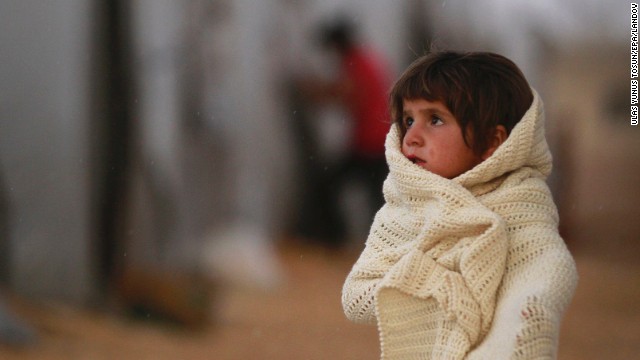Oct 18, 2014
What lures Americans to Syria fight, CNN.com
What lures Americans to Syria fight
By Peter Bergen and David Sterman
updated 7:25 AM EDT, Tue October 14, 2014
 A Syrian refugee wraps herself in a blanket as she stands near tents in the Suruc district near Sanliurfa, Turkey, on Thursday, October 2. As many as 200,000 people have left the area surrounding the Syrian city of Kobani, also known as Ayn al-Arab, because of the militant group ISIS, the Syrian Observatory for Human Rights said in September.
A Syrian refugee wraps herself in a blanket as she stands near tents in the Suruc district near Sanliurfa, Turkey, on Thursday, October 2. As many as 200,000 people have left the area surrounding the Syrian city of Kobani, also known as Ayn al-Arab, because of the militant group ISIS, the Syrian Observatory for Human Rights said in September.
STORY HIGHLIGHTS
- 12 Americans have been charged with supporting militant groups in Syria or have died there
- Peter Bergen: They are young, mostly not college grads, likely to have traveled through Turkey
- None is of Syrian descent; they represent a wide mix of ethnic backgrounds, he says
- Bergen: All but two of the 12 were active on jihadi social media
None of the dozen appears to be of Syrian descent.
This is in contrast to the some 30 Americans who were drawn to fight in Somalia from 2007 onward alongside the al Qaeda affiliated Al-Shabaab group. They were largely of Somali descent and were overwhelmingly from Minnesota, where there is a large Somali-American population. The 12 American militants drawn to the Syrian conflict come from a wide range of states: California, Colorado, Florida, Illinois, Minnesota, New York, North Carolina and Texas. They are also generally young with an average age of 24. Three teenagers are among those charged: -- Shannon Conley, a 19-year old California womanpleaded guilty last month to attempting to join ISIS. -- Mohammed Hamza Khan, a 19-year-old Illinois manarrested this month, allegedly sought to join ISIS. He is awaiting trial. -- Abdella Tounisi from Chicago was 18 when he wascharged last year with seeking to support Nusra in Syria. He is on trial. The Americans seeking to fight in Syria are not a particularly educated group. For the nine of the 12 individuals for whom educational attainment is known, none graduated from college. Perhaps critically, all but two of the 12 were active on jihadi social media. ISIS in particular has made a determined effort to recruit Western fighters over social media, for example releasing a 55-minute English languagepropaganda and recruitment video on Twitter last month. The heavy social media use of individuals traveling to Syria is something of a boon for American security services. The social media use of Douglas McCain, a 33-year-old man from Minnesota, who died fighting with ISIS in August, reportedly landed him on a terrorist watch list and helped the United States track him. Once individuals are radicalized and are convinced to join ISIS or Nusra, they often decide to travel to Syria through Turkey. -- Moner Abu Salha, a 22-year-old from Florida, explained how he traveled to Turkey and met up with jihadist facilitators there in a propaganda video that was released in August after he died conducting a suicide bombing in Syria. -- Douglas McCain also traveled through Turkey earlier this year. -- Adam Dandach, a 20-year-old from Orange County, California, was arrested in July for passport fraud en route to Turkey allegedly to join ISIS. He is on trial. -- Mohammed Hamza Khan purchased tickets to travel to Turkey via Austria according to the complaint filed in his case. The importance of the Turkish route into Syria likely provides the key to reduce the number of Americans traveling to fight in Syria. For example, look at the case of Donald Morgan, a 44-year-old from North Carolina, who sought to travel to fight in Syria but has not been charged with a terrorism-related crime. He was turned back at Istanbul Airport by Turkish authorities this summer. There are reports that Turkey may be stepping up its efforts to close the routes that allow foreigners to reach the Syrian conflict and join jihadist groups. We can only hope that is the case. U.S. law enforcement has also made a determined effort to track Americans engaged in the Syrian conflict. Seven of the 12 individuals charged in the past two years were monitored closely by an FBI informant. Even in the case of Moner Abu Salha, who returned from training in Syria to the States in May 2013, a tip to the FBI from a friend he tried to recruit when he was back in the States placed him on the FBI's radar. Still there are limits to that tracking. FBI Director James Comey was asked by the CBS show "60 Minutes" earlier this month whether he knew the identity of the dozen or so Americans believed to be fighting in Syria. Comey said, "I think of that, dozen or so, I do. I hesitate only because I don't know what I don't know."
FEATURED BOOK

